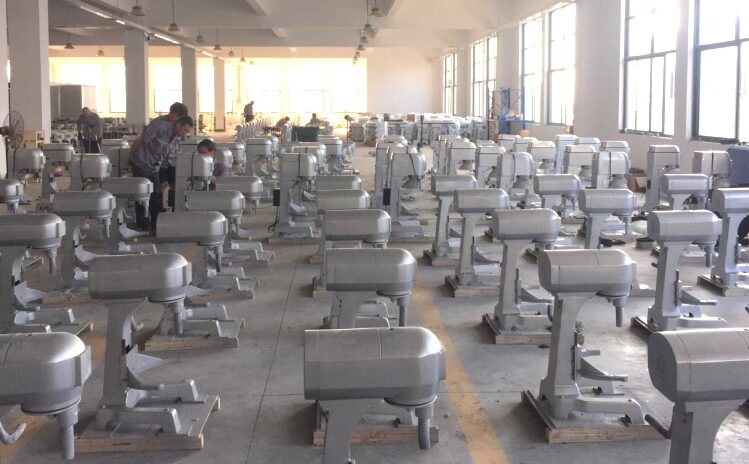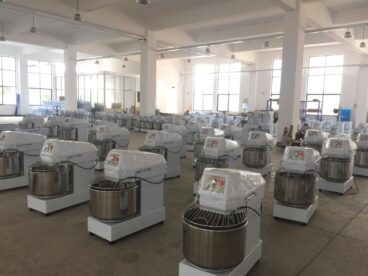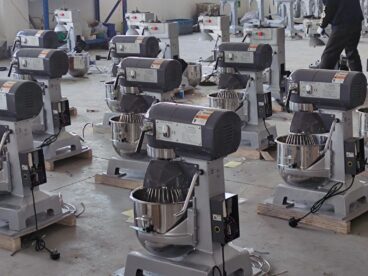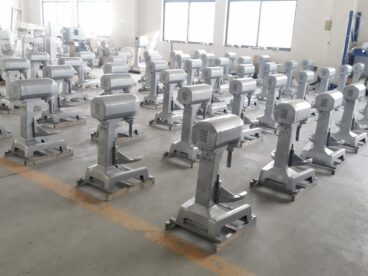In the world of baking and dough preparation, choosing the right equipment is crucial for achieving consistent, high-quality results. Among the various types of mixers available, the spiral mixer stands out as a favorite for many professionals. This article delves into the numerous advantages of using a spiral mixer, making a compelling case for why it might be the perfect addition to your kitchen.
1. Superior Dough Quality
One of the primary reasons bakers prefer spiral mixers is the superior dough quality they produce. Spiral mixers are specifically designed for dough mixing, ensuring that the dough is mixed gently and thoroughly. This gentle mixing action preserves the dough’s gluten structure, leading to better texture and consistency. The resulting dough has improved elasticity and strength, which is essential for making high-quality bread and other baked goods.
2. Efficient Mixing
Spiral mixers are highly efficient in their operation. The design of the mixer allows for the bowl and the spiral to rotate simultaneously. This dual motion ensures that the dough is mixed more uniformly and quickly compared to other mixers. The efficient mixing process saves time and reduces energy consumption, making it an environmentally friendly option as well.
3. Versatility
Despite being primarily used for dough, spiral mixers are versatile and can handle a variety of mixing tasks. They can mix small to large batches of dough with ease, accommodating different production needs. Whether you are making bread, pizza dough, pastries, or other baked goods, a spiral mixer can handle the task efficiently.
4. Consistency and Uniformity
Consistency is key in baking, and spiral mixers excel in providing uniform mixing results. The design of the spiral mixer ensures that all ingredients are evenly incorporated into the dough. This uniformity is crucial for maintaining the quality and taste of the final product. With a spiral mixer, you can be confident that every batch of dough will have the same high quality.
5. Reduced Heat Generation
One of the unique advantages of spiral mixers is their ability to reduce heat generation during the mixing process. Excessive heat can negatively impact the dough, causing it to ferment prematurely or lose its desired texture. Spiral mixers operate at slower speeds and use a gentle mixing action, minimizing heat buildup. This feature is particularly beneficial for delicate doughs that require precise temperature control.
6. Durability and Longevity
Spiral mixers are known for their robust construction and durability. They are built to withstand the demands of commercial kitchens and heavy-duty mixing tasks. The materials used in spiral mixers, such as stainless steel, are resistant to corrosion and wear, ensuring a long lifespan. Investing in a high-quality spiral mixer means you will have a reliable piece of equipment that will serve you well for many years.
7. Ease of Use and Maintenance
Using a spiral mixer is straightforward, even for those who are new to baking. The controls are intuitive, and the mixing process is largely automated, reducing the need for constant supervision. Additionally, spiral mixers are designed with ease of maintenance in mind. Many models have removable bowls and mixing spirals, making them easy to clean. Regular maintenance is simple and helps ensure the longevity of the mixer.
8. Space-Saving Design
In many commercial kitchens, space is at a premium. Spiral mixers are typically more compact compared to other types of mixers with similar capacities. Their vertical design allows them to fit into smaller spaces without sacrificing performance. This space-saving feature is particularly advantageous for small bakeries or kitchens with limited room.
9. Improved Safety Features
Modern spiral mixers come equipped with advanced safety features to protect users. These may include emergency stop buttons, safety guards, and automatic shut-off mechanisms if the mixer is overloaded or if the bowl is not properly secured. These safety features help prevent accidents and ensure a safer working environment.
10. Cost-Effective Investment
While the initial cost of a spiral mixer may be higher than some other types of mixers, it is a cost-effective investment in the long run. The durability, efficiency, and consistency provided by a spiral mixer translate into savings on maintenance, repairs, and ingredient costs. Moreover, the high-quality dough produced by a spiral mixer can lead to better end products, potentially increasing sales and profitability.
11. Energy Efficiency
Spiral mixers are designed to be energy efficient, consuming less power compared to other types of mixers. This is achieved through their efficient mixing action and the use of high-quality motors that require less energy to operate. Lower energy consumption not only reduces operational costs but also contributes to a more sustainable and environmentally friendly kitchen.
12. Adaptability to Different Dough Types
Different doughs have varying requirements, and a spiral mixer is versatile enough to adapt to these needs. Whether you are working with stiff doughs like bagels and pizza or softer doughs like brioche and ciabatta, a spiral mixer can handle the job. The ability to adjust mixing speeds and times allows bakers to fine-tune the process for different recipes, ensuring optimal results every time.
13. Enhanced Productivity
The efficient and consistent performance of spiral mixers enhances overall productivity in the kitchen. Bakers can produce larger quantities of dough in less time, meeting higher demand without compromising quality. This increased productivity is especially beneficial for commercial bakeries and food production facilities where time and output are critical.
14. Better Ingredient Incorporation
Spiral mixers excel at incorporating ingredients evenly into the dough. This is particularly important for recipes that require the addition of fruits, nuts, seeds, or other inclusions. The gentle mixing action ensures that these ingredients are distributed uniformly throughout the dough, preventing clumping and ensuring a consistent taste and texture in the final product.
15. User-Friendly Features
Many modern spiral mixers come with user-friendly features that enhance the overall baking experience. These may include programmable controls, timers, and digital displays that allow for precise control over the mixing process. Such features make it easier for bakers to achieve consistent results and experiment with new recipes.
Conclusion
In conclusion, spiral mixers offer a myriad of advantages that make them an indispensable tool in any bakery or kitchen. From superior dough quality and efficient mixing to durability, ease of use, and energy efficiency, the benefits of spiral mixers are numerous. Whether you are a professional baker or an enthusiastic home cook, investing in a spiral mixer can significantly enhance your baking process and the quality of your baked goods. With their ability to produce consistent, high-quality dough, spiral mixers truly stand out as a worthwhile investment for anyone serious about baking.
the world of baking and dough preparation, choosing the right equipment is crucial for achieving consistent, high-quality results. Among the various types of mixers available, the spiral mixer stands out as a favorite for many professionals. This article delves into the numerous advantages of using a spiral mixer, making a compelling case for why it might be the perfect addition to your kitchen.
1. Superior Dough Quality
One of the primary reasons bakers prefer spiral mixers is the superior dough quality they produce. Spiral mixers are specifically designed for dough mixing, ensuring that the dough is mixed gently and thoroughly. This gentle mixing action preserves the dough’s gluten structure, leading to better texture and consistency. The resulting dough has improved elasticity and strength, which is essential for making high-quality bread and other baked goods.
2. Efficient Mixing
Spiral mixers are highly efficient in their operation. The design of the mixer allows for the bowl and the spiral to rotate simultaneously. This dual motion ensures that the dough is mixed more uniformly and quickly compared to other mixers. The efficient mixing process saves time and reduces energy consumption, making it an environmentally friendly option as well.
3. Versatility
Despite being primarily used for dough, spiral mixers are versatile and can handle a variety of mixing tasks. They can mix small to large batches of dough with ease, accommodating different production needs. Whether you are making bread, pizza dough, pastries, or other baked goods, a spiral mixer can handle the task efficiently.
4. Consistency and Uniformity
Consistency is key in baking, and spiral mixers excel in providing uniform mixing results. The design of the spiral mixer ensures that all ingredients are evenly incorporated into the dough. This uniformity is crucial for maintaining the quality and taste of the final product. With a spiral mixer, you can be confident that every batch of dough will have the same high quality.
5. Reduced Heat Generation
One of the unique advantages of spiral mixers is their ability to reduce heat generation during the mixing process. Excessive heat can negatively impact the dough, causing it to ferment prematurely or lose its desired texture. Spiral mixers operate at slower speeds and use a gentle mixing action, minimizing heat buildup. This feature is particularly beneficial for delicate doughs that require precise temperature control.
6. Durability and Longevity
Spiral mixers are known for their robust construction and durability. They are built to withstand the demands of commercial kitchens and heavy-duty mixing tasks. The materials used in spiral mixers, such as stainless steel, are resistant to corrosion and wear, ensuring a long lifespan. Investing in a high-quality spiral mixer means you will have a reliable piece of equipment that will serve you well for many years.
7. Ease of Use and Maintenance
Using a spiral mixer is straightforward, even for those who are new to baking. The controls are intuitive, and the mixing process is largely automated, reducing the need for constant supervision. Additionally, spiral mixers are designed with ease of maintenance in mind. Many models have removable bowls and mixing spirals, making them easy to clean. Regular maintenance is simple and helps ensure the longevity of the mixer.
8. Space-Saving Design
In many commercial kitchens, space is at a premium. Spiral mixers are typically more compact compared to other types of mixers with similar capacities. Their vertical design allows them to fit into smaller spaces without sacrificing performance. This space-saving feature is particularly advantageous for small bakeries or kitchens with limited room.
9. Improved Safety Features
Modern spiral mixers come equipped with advanced safety features to protect users. These may include emergency stop buttons, safety guards, and automatic shut-off mechanisms if the mixer is overloaded or if the bowl is not properly secured. These safety features help prevent accidents and ensure a safer working environment.
10. Cost-Effective Investment
While the initial cost of a spiral mixer may be higher than some other types of mixers, it is a cost-effective investment in the long run. The durability, efficiency, and consistency provided by a spiral mixer translate into savings on maintenance, repairs, and ingredient costs. Moreover, the high-quality dough produced by a spiral mixer can lead to better end products, potentially increasing sales and profitability.
11. Energy Efficiency
Spiral mixers are designed to be energy efficient, consuming less power compared to other types of mixers. This is achieved through their efficient mixing action and the use of high-quality motors that require less energy to operate. Lower energy consumption not only reduces operational costs but also contributes to a more sustainable and environmentally friendly kitchen.
12. Adaptability to Different Dough Types
Different doughs have varying requirements, and a spiral mixer is versatile enough to adapt to these needs. Whether you are working with stiff doughs like bagels and pizza or softer doughs like brioche and ciabatta, a spiral mixer can handle the job. The ability to adjust mixing speeds and times allows bakers to fine-tune the process for different recipes, ensuring optimal results every time.
13. Enhanced Productivity
The efficient and consistent performance of spiral mixers enhances overall productivity in the kitchen. Bakers can produce larger quantities of dough in less time, meeting higher demand without compromising quality. This increased productivity is especially beneficial for commercial bakeries and food production facilities where time and output are critical.
14. Better Ingredient Incorporation
Spiral mixers excel at incorporating ingredients evenly into the dough. This is particularly important for recipes that require the addition of fruits, nuts, seeds, or other inclusions. The gentle mixing action ensures that these ingredients are distributed uniformly throughout the dough, preventing clumping and ensuring a consistent taste and texture in the final product.
15. User-Friendly Features
Many modern spiral mixers come with user-friendly features that enhance the overall baking experience. These may include programmable controls, timers, and digital displays that allow for precise control over the mixing process. Such features make it easier for bakers to achieve consistent results and experiment with new recipes.
Conclusion
In conclusion, spiral mixers offer a myriad of advantages that make them an indispensable tool in any bakery or kitchen. From superior dough quality and efficient mixing to durability, ease of use, and energy efficiency, the benefits of spiral mixers are numerous. Whether you are a professional baker or an enthusiastic home cook, investing in a spiral mixer can significantly enhance your baking process and the quality of your baked goods. With their ability to produce consistent, high-quality dough, spiral mixers truly stand out as a worthwhile investment for anyone serious about baking.






